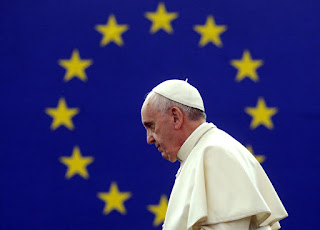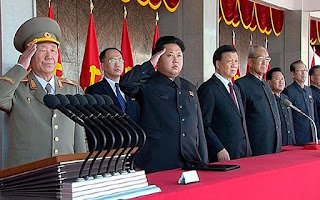Time to Try Divine Diplomacy in the Ukrainian Crisis
Time
to Try Divine Diplomacy in the Ukrainian Crisis
By E. Stanley Ukeni
It seems like it’s time for divine intervention in
the intractable Ukrainian civil strife. Today, June 10, 2015, the
English-language news outlet of the Russian government reported that President
Vladimir Putin is traveling to the Vatican for a meeting with the Pope.
The news report indicated that one of the principle
topics of discussion at the critical meeting will be the civil war in Ukraine. This
meeting between the Russian leader and another very influential world leader,
the Pope, follows at the heel of the meeting of the Heads of State of the Group
of Seven industrialized nations two days ago—where Vladimir Putin was denied
attendance. Although the State of Vatican City is a tiny country by all
standards—with an estimated population of about 842, the Vatican City is still
considered a superpower State.
What the report failed to indicate is that President Putin is going to the Vatican armed with a dossier containing long list of complaint against western leaders—whom he claims has unjustly undermined his government, and is aiming to cripple the country’s economy. I assume the dossier contains Kremlin’s evidence that the violence in Ukraine is being fueled by western powers. There are also indications that President Putin will also deliver a warning of unspecified Kremlin’s response to the stringent economic sanctions being imposed on Russia—especially if additional sanctions are imposed on his nation. The word is still out on whether the Pontiff lent a sympathetic ear to President Putin’s grievances.
What the report failed to indicate is that President Putin is going to the Vatican armed with a dossier containing long list of complaint against western leaders—whom he claims has unjustly undermined his government, and is aiming to cripple the country’s economy. I assume the dossier contains Kremlin’s evidence that the violence in Ukraine is being fueled by western powers. There are also indications that President Putin will also deliver a warning of unspecified Kremlin’s response to the stringent economic sanctions being imposed on Russia—especially if additional sanctions are imposed on his nation. The word is still out on whether the Pontiff lent a sympathetic ear to President Putin’s grievances.
Vatican observers and diplomats around the world
will no doubt be watching to see how much of his influence and power the Bishop
of Rome is going to exert on the Russian leader in other to persuade him to change
course as regards to the Ukrainian war and the Russian annexation of Crimea.
As a side note, it is worth noting that, over the
past six years, since diplomatic ties was fully established between the two
nations, the Holy See has been working hard to build and strengthen diplomatic
and religious relationship with the Russian State. Pope Francis has
particularly worked astutely to nurture closer ties between the Vatican and
Russia, perhaps in an effort to advance the Vatican’s diplomatic and other
interests within Russia’s spheres of influence.
It is well to equally note that no Vatican Pope has
ever visited Russia, whose principle religion is the Orthodox Christian Faith. And
it is no secret that the Russian Orthodox Church is closely tied to President
Vladimir Putin’s government.
In practical terms, even if Pope Francis adopts a
hardline position against Russia’s involvement in the Ukrainian civil war,
there are limits to his influence over the Russian leader. After all, even the
collective economic and political pressure exerted by the G7 nations has not
been enough thus far to persuade Vladimir Putin to change direction in the Ukrainian
matter. But then again, the Holy Pontiff is the Vicar of Christ, it is not
entirely out of order to expect a miracle here.
Authored by E. Stanley Ukeni, © 2015. All Rights
Reserved.




Comments
Post a Comment